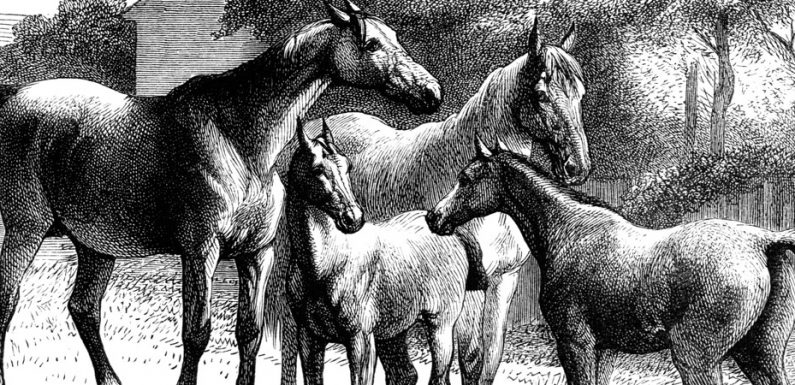
What is fragile foal syndrome?
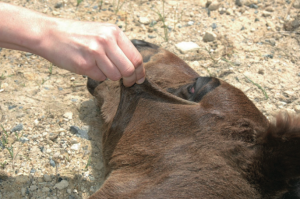
Fragile foal syndrome (FFS) is a severe inherited disorder that has been found in a number of horse breeds. It is most commonly found in Warmbloods and is often known as Warmblood fragile foal syndrome.
Foals with FFS are born with extremely fragile skin and mucous membranes, and sometimes lax limb joints. Their skin can be easily torn or damaged by normal contact with their surroundings. It can also tear away from the underlying tissue, leading to bleeding under the skin. Foals with FFS are usually euthenized due to their inability to stand, or the continual risk of infection from their skin injuries.
It’s also been speculated that some foals with FFS are aborted or miscarried pre-term. In this situation it may be difficult to see signs that the foal was affected.
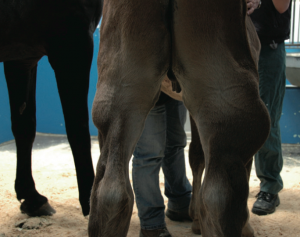
FFS is an autosomal recessive disorder. Autosomal disorders are equally likely to affect male or female horses, while “recessive” means that a horse needs to inherit the FFS mutation from both its sire and its dam to be affected. Horses that have inherited the FFS mutation from just one parent are called FFS carriers, and do not have physical signs of this disorder.
Genetic testing can be used to find out whether a horse is an FFS carrier. The FFS mutation is a single point mutation in the PLOD1 gene. Horses only need to be tested once in their lifetime. Results do not change with age.
Using information from genetic testing, FFS can easily be avoided. You simply need to make sure that the prospective foal can’t inherit the FFS mutation from both its sire and its dam. If you mate a carrier to a FFS-negative horse there is no risk of the foal being affected.
Is it HERDA?
No, it’s not HERDA. HERDA is a separate genetic disorder found in some Quarter Horses and related breeds.
How common is FFS?
For Warmbloods it looks like roughly 7-10% of horses are FFS carriers, with even higher rates in some continents.
Breeds with similar origins to Warmbloods are also likely to have carriers. Examples include Knabstruppers and sport horses.
Some Thoroughbreds have also been identified as being carriers of WFFS. As of May 2018, we don’t know how common this is.
Foals are affected by fragile foal syndrome when they inherit one copy of the fragile foal mutation from the sire, and one from the dam. If breeders don’t have testing available to avoid mating carriers, you can estimate how many foals are likely to be affected using this equation.
% affected foals = (% carriers)2 / 4
Take a carrier rate of 10% as an example. For these horses, we do (0.1)2 / 4 = 0.0025, meaning 0.25% of foals would be affected (that sounds pretty low but it’s 1 in 400). Most breeders would know someone who had a case in their breeding career.
If breeders use genetic testing to identify carriers and then avoid mating carrier to carrier, this can be reduced to zero. Carriers can be safely mated to horses that have tested negative; in this situation they have no chance of producing an affected foal.
So how is FFS inherited?
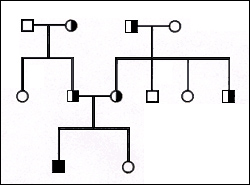
Every mammal including horses and people have two copies of most genes. When they reproduce, each animal randomly passes on just one of its two copies. (If it’s been a while since you did biology, do some reading on meiosis and sexual reproduction.)
Carriers of FFS have one copy of the normal gene, and one copy of the mutated gene. For each foal they produce, there is a 50:50 chance that they’ve passed on the normal gene, and a 50:50 chance that they passed on the mutated gene instead.
The discoverer of the FFS mutation, Dr. Nena Winand, thinks the mutation originally occurred hundreds of years ago, creating a single carrier. Between then and now, it quietly got passed down through the generations. Along the way it must have been present in some pretty popular horses, because it spread into many breeds.
Testing for FFS
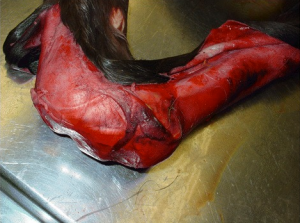
Testing for FFS is available is available at a number of laboratories around the world. Here in Australia PHG is offering the test (the price is $54 per horse including GST). We are currently verifying our test against the test offered at UC Davis to ensure that owners are getting the same results no matter where they choose to test.
All laboratories will accept hair root samples (the same type of sample you would send for parentage verification, pulled from the mane or tail). Each sample should be taken with clean hands to prevent contamination between samples. You can clean your hands by wiping thoroughly on a fresh baby wipe each time or wash them in running water between horses.
Testing can also be carried out using semen from straws if the horse itself is not available for a hair sample. In this case you should ideally post an empty straw (all doses used but straw not rinsed). The straw should be placed in a ziplock bag, and kept in the freezer prior to posting. Express post it to make sure it reaches us before the semen breaks down too much.
We will also carry out free testing on tissue from Warmblood foals that are miscarried mid to late-term to determine whether any of these foals are affected by FFS. Call us on 0410 492 005 to confirm what tissue sample to take and to let us know that your sample is coming.
Breed society/association discounts
If your breed may be affected by FFS you can get in touch with Practical Horse Genetics to organise a breed society or association discount. All orders that use that discount code will have their results automatically copied to the registrar.
Owners who want to keep their results private should order personally rather than using the breed society discount. Results from private orders are just sent to the owner. They can then choose to pass them on to their registrar later if they wish.